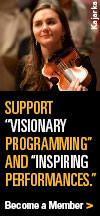Opening Chords from Temptation
<< Return to concert description
“On my iPod there is a playlist called ’True Heartbreak.’ In it, right between Adele and Billy Joel, is this piece. Schubert’s 19th century pop song, with its repetitive motive and recurring refrain, is my favorite track on the playlist because it most perfectly captures the emotions of a breaking heart. Listening to the piece, I can indulge in Gretchen’s heartache and her desire to lose herself in memory. When I sing the piece, I give in completely and experience her passions, heartaches, and temptations as if they were my own. Audiences should attend One World Symphony’s Temptation concert to indulge in their own need for pain, seduction, and heartache, without the hassle of negative consequence.” — Abigail Kempson on Schubert’s Gretchen am Spinnrade
“While there may be a chill creeping into the air as autumn approaches, One World Symphony’s Temptation program will keep you warm with tantalizing excerpts from Camille Saint-Saëns lusty grand opera Samson et Dalila. If you value your own luscious locks, you may want to keep them out of sight as we cast a spell of seduction with the Bacchanale, lest your tresses end up in the hands of Dalila. Don’t worry, you can let your hair down again as we move on to sultry selections from Hindemith, Puccini, Saariaho and Schubert. The cast of characters in this special Halloween program can even give you some great classic costume inspiration: nun, devil, soldier or perhaps ancient priestess!” — Bettina May on Saint-Saëns’ Samson et Dalila
“In Douleur, the line ‘le remords me brûle,’ which echoes throughout the piece, shows the character’s raw emotion. The song is so human in its expression, jumping between terror and ecstasy. I think I need to keep repeating ‘le remords me brûle ’ just to try and convince myself that I didn’t enjoy my sexual encounter, although the high-flying vocal line would suggest otherwise. The song is the very essence of having a love-hate relationship, something we can all relate to.” — Christina Douglas on Saariao’s Douleur
“Angelica keeps the deep secret of her sinful past – her illegitimate son – until she learns of his death. As she takes her own life to join him in heaven, she realizes that she has succumbed yet again to temptation by committing a mortal sin. As she takes her last breaths, she is redeemed by a divine miracle. Anyone that has had to make an important career or life choice can relate to Angelica. How often we are consumed solely by our desires without thinking of the consequences. Yet, the final scene of this opera reminds us that forgiveness is there for those who seek it.” — Dominique Donnarumma on Puccini’s Suor Angelica
“The two songs from Hindemith’s song cycle Das Marienleben about the life of the Virgin Mary tell stories of doubt, suspicion and temptation of faith through encounters with Angels that preach it like it is! In ’Joseph’s Suspicion’, an Angel appears to Joseph to set him straight — he is suspicious of Mary’s surprise pregnancy! No doubt! This music if filled with chattering inner turmoil and struggle — like Joseph’s mind running on and on trying to make sense of it all. Who hasn’t ever wrestled with their own chattering thoughts? Hindemith’s music expresses these feelings perfectly. When the Angel asks Joseph to drop his ego and trust God, the voice soars and expands like light illuminating a dark, cluttered room. This song expresses those mixed up, messy and confusing moments in life, when we don’t always find our way through the temptation of our own doubts - at least not without a little help. The Angel in ’From the Death of Mary’ leaps in to action to shake the Apostle Thomas out of his doubt that Mary has ascended to heaven. The strong heralding theme says ‘Wake up! Listen! Look! Something amazing has happened!’ Even though doubting Thomas is the subject, this music is filled with strength, faith and determined energy. This powerful song represents doubt vanquished. The Angel declares with ascending phrases that Mary has escaped death. There is no sadness or confusion in this song – this Angel heralds a miracle. Like a good friend who finally speaks the truth and reality, the Angel pulls Thomas from his doubting mind into the light of understanding. This song bolsters my heart with strength, and conviction. It makes me feel hopeful and wonder what my own angel might say to me. — Jennifer Sgroe on Hindemith’s Marieleben (arranged and orchestrated by Sung Jin Hong)
“When Maestro Hong first asked if I would sing Kaija Saariaho’s Douleur and Parfum de l’instant from her Quatre Instants, I was more than a little intrigued. As a musician, it has always been tempting for me to learn contemporary works; to indulge in the sound creations by living composers whose pallet has been exploded by the experimentation of the twentieth century. Imagine my delight when I discovered these songs exemplify that freedom of expression with ambiguous tonality, repeating orchestral figures under a lyrical and narrative vocal line. Upon further research, I discovered that not only were the poems in French, my favorite language, but that the composer is Finnish and the poet, Amin Maalouf, is of Lebanese decent. What a wonderful combination; it brings to mind of all the tempting indulgences of those cultures. One can almost smell the Arabian coffee and imagine it mixed with a French pastry. I happen to be of Finnish decent and I just spent the last few years living in the Middle East. I knew then that these glorious pieces expertly chosen by Maestro Hong due to their inherent temptation without resolution pathos, would be a wonderful vehicle to express in song the very essence of temptation.” — Karin Laine on Saariaho’s Douleur and Parfum de l’instant
“Temptation in all of its debauchery leads us to find Gretchen, alone at her spinning wheel, day-dreaming of Faust, who she has just met. The undulating spinning wheel, analogous to Gretchen’s passion for Faust, is painted by the orchestra in sweeping musical patterns. Gretchen’s all-encompassing obsession with Faust causes her to lose control, even stopping the wheel. She embodies ’temptation without resolution.” — Kathleen Theisen on Schubert’s Gretchen am Spinnrade
Sunday, October 27, 2013
Holy Apostles Church
Manhattan
Monday, October 28, 2013
Holy Apostles Church
Manhattan





